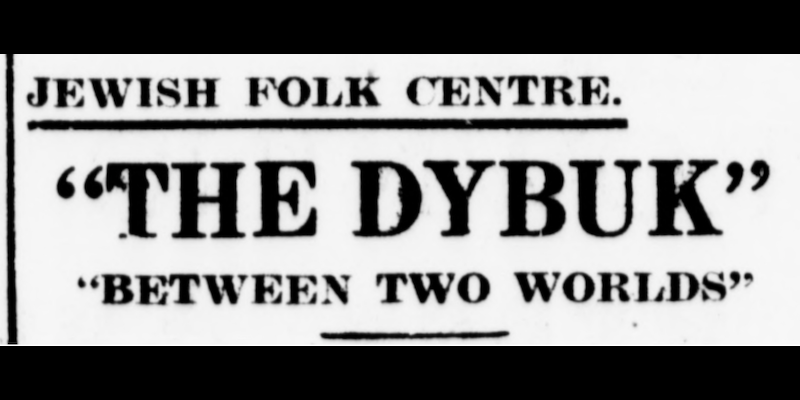DYBBUK is a 5-year research project, based at the University of Haifa and funded by the European Research Council, that sets out to uncover and explore the popular theatre that made up the daily cultural reality of the Jewish masses at the turn of the 20th century.
Amid a massive migration movement at the turn of the 20th century, the Yiddish popular theatre prospered, producing a staggering volume of entertainment consumed by millions of Jews. Most of this mass-appealing output was delegitimised by Jewish intellectuals as Shund (trash), a term that encompasses primitive, plagiarised, vulgar, and worthless art. Consequently, a valuable component of modern popular culture has been overlooked. The EU-funded (ERC) DYBBUK Project will restore this neglected yet highly influential corpus of Yiddish popular theatre and make it available for our appreciation. Focusing on the unexplored theatrical corpus of the two most prolific Shund theatre makers, Moyshe Hurwitz (1844-1910) and Joseph Lateiner (1853-1935), this project offers an integrative typological, embodied, and theoretical analysis of theatrical themes, forms, and practices.
Part of the DYBBUK Project is developing and implementing an interactive open-access online database of Yiddish popular theatre materials. The database will be a rich, searchable, and constantly updated repository of artists, musicians, works, sources, and their diverse intersections. The database will contain information and archival materials about performances, their artistic contexts, with manuscripts, sound recordings, and relevant scholarship. This digital platform will enable us to analyze the transnational network of Yiddish popular theatre, to uncover and study new relationships between performances, artists, and dramatic and musical works. This database will serve theatre, musicology, and performance studies, as well as cultural historians and artists.
The project already created a free public AI model for Handwritten Text Recognition with Transkribus.
(Description adapted from information on project website)
Subject Period (epoch)
Subject Continent(s)
Subject Country(ies)
Topic(s)
Subject Language(s)
Project Language(s)
Project Media
Project Access
Project Status
Project Creator Continent(s)
Project Creator Country(ies)


DYBBUK is a 5-year research project, based at the University of Haifa and funded by the European Research Council, that sets out to uncover and explore the popular theatre that made up the daily cultural reality of the Jewish masses at the turn of the 20th century.
Amid a massive migration movement at the turn of the 20th century, the Yiddish popular theatre prospered, producing a staggering volume of entertainment consumed by millions of Jews. Most of this mass-appealing output was delegitimised by Jewish intellectuals as Shund (trash), a term that encompasses primitive, plagiarised, vulgar, and worthless art. Consequently, a valuable component of modern popular culture has been overlooked. The EU-funded (ERC) DYBBUK Project will restore this neglected yet highly influential corpus of Yiddish popular theatre and make it available for our appreciation. Focusing on the unexplored theatrical corpus of the two most prolific Shund theatre makers, Moyshe Hurwitz (1844-1910) and Joseph Lateiner (1853-1935), this project offers an integrative typological, embodied, and theoretical analysis of theatrical themes, forms, and practices.
Part of the DYBBUK Project is developing and implementing an interactive open-access online database of Yiddish popular theatre materials. The database will be a rich, searchable, and constantly updated repository of artists, musicians, works, sources, and their diverse intersections. The database will contain information and archival materials about performances, their artistic contexts, with manuscripts, sound recordings, and relevant scholarship. This digital platform will enable us to analyze the transnational network of Yiddish popular theatre, to uncover and study new relationships between performances, artists, and dramatic and musical works. This database will serve theatre, musicology, and performance studies, as well as cultural historians and artists.
The project already created a free public AI model for Handwritten Text Recognition with Transkribus.
(Description adapted from information on project website)
